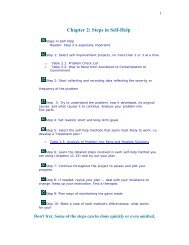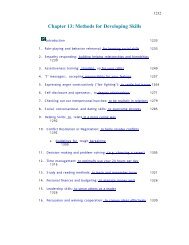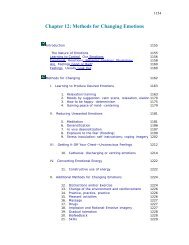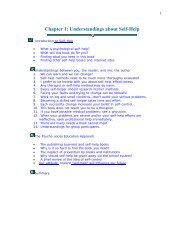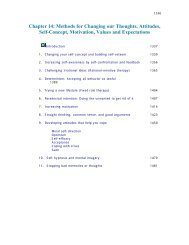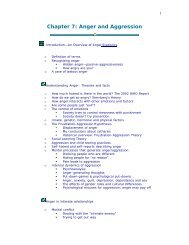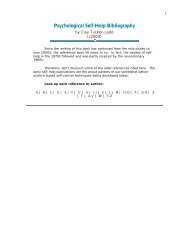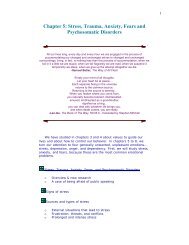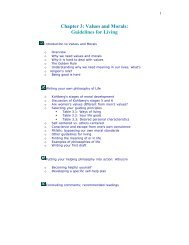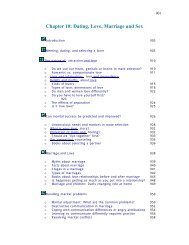Methods for Changing Behaviors - Psychological Self-Help
Methods for Changing Behaviors - Psychological Self-Help
Methods for Changing Behaviors - Psychological Self-Help
Create successful ePaper yourself
Turn your PDF publications into a flip-book with our unique Google optimized e-Paper software.
Time involved<br />
Little time is required to ask your self if you are hassled and/or<br />
obstructed by an inner critic. If so, it should not take long to see the<br />
logic of trying out another mental attitude. If a new skill is needed to<br />
bolster a more optimistic attitude, that will take more time.<br />
If the nature of the job needs to be changed to match your<br />
capabilities, it may be something you can do rather easily by yourself<br />
by making it more or less demanding. If the job has to be changed<br />
radically or can't be made to challenge your mind, that may be very<br />
difficult (see chapter 13 <strong>for</strong> suggestions about choosing a career).<br />
Common problems with the method<br />
A defeatist attitude is hard to change. Don't confuse this<br />
destructive self-putdown attitude with the demanding attitude of<br />
perfectionists. The tennis pros may have a severe inner critic (when<br />
they get mad at themselves) but they expect to play fantastically well.<br />
The pros also know the importance of "settling down," of "loosing<br />
ourselves in the game (flow)," and of having a good mental attitude.<br />
Some people just can't let go of their self-criticism, perhaps it serves<br />
some important purpose (like avoiding criticism from others).<br />
Effectiveness, advantages and dangers<br />
Our interpretation of doing poorly (not enough ability or not<br />
enough ef<strong>for</strong>t) is known to influence our subsequent per<strong>for</strong>mance. In<br />
some cases, our self-evaluations can be easily changed (such as by<br />
reading some self-help material). In other cases, renewed ef<strong>for</strong>t<br />
produces convincing results: "I'm damn good at this." There are no<br />
known dangers. We will, in a life-time of testing our limits, of course,<br />
have to occasionally face the conclusion that we are lacking in ability<br />
or that the payoffs are not worth the ef<strong>for</strong>t required. The alternative is<br />
to live without knowing our potential.<br />
Additional readings<br />
Gallwey, W. T. (1974). The inner game of tennis. New York:<br />
Bantam Books.<br />
Csikszentmihalyi, M. (1990). Flow: The psychology of optimal<br />
experience. New York: Harper & Row.<br />
Develop positive expectations; increase self-efficacy<br />
<strong>Self</strong>-efficacy is a very old notion (self-confidence or belief in<br />
oneself) but a popular new psychology term (Bandura, 1977b, 1980a).<br />
It influences what we try to do and <strong>for</strong> how long. Where does a belief<br />
1117



